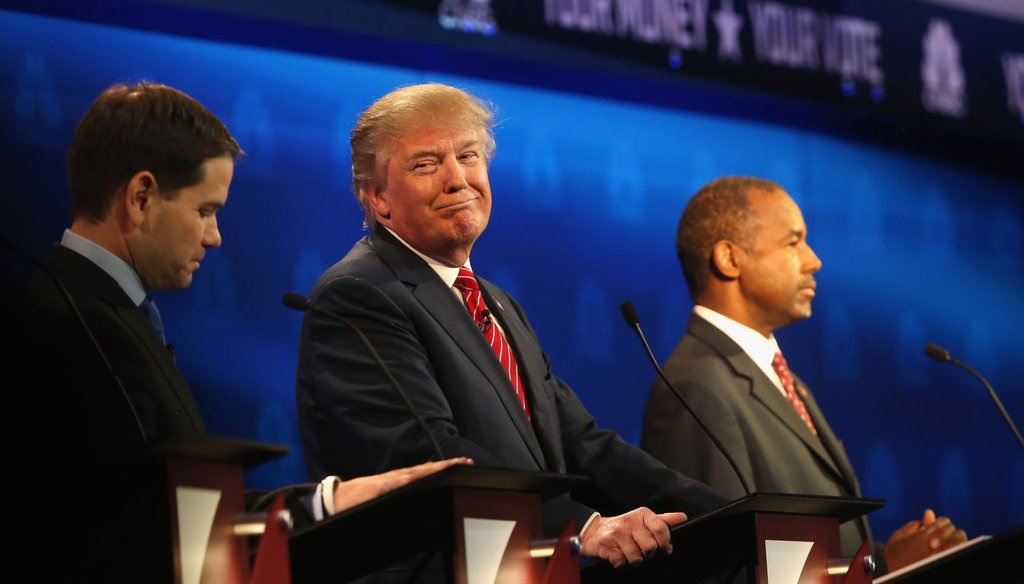Stand up for the facts!
Our only agenda is to publish the truth so you can be an informed participant in democracy.
We need your help.
I would like to contribute

Presidential candidates Marco Rubio, Donald Trump and Ben Carson took the stage at the CNBC Republican Presidential Debate on Oct. 28, 2015, in Boulder, Colo. (Getty Images)
Last updated on Monday, Nov. 2, 2015, at 11 a.m.
Republican presidential candidates held nothing back in their fiery third debate Wednesday, throwing punch after punch at each other, Democrats, the moderators and the press.
Florida Sen. Marco Rubio sparred with his former mentor former Florida Gov. Jeb Bush throughout the night, and earned cheers and applause with this twofer: "The Democrats have the ultimate super PAC, it is called the mainstream media."
That sentiment was repeated by Texas Sen. Ted Cruz:
"The questions that have been asked so far in this debate illustrate why the American people don't trust the media," Cruz said. "This is not a cage match. And, you look at the questions -- ‘Donald Trump, are you a comic-book villain?’ ‘Ben Carson, can you do math?’ ‘John Kasich, will you insult two people over here?’ ‘Marco Rubio, why don't you resign?’ ‘Jeb Bush, why have your numbers fallen?’ How about talking about the substantive issues the people care about?"
Sign up for PolitiFact texts
PolitiFact is looking into several claims from the debate, some more cage-matchy, and others about substantive issues. Here’s what we’ve fact-checked so far. (We’ll update this story as we add more.)
Carly Fiorina on women's job losses
Former Hewlett-Packard CEO Carly Fiorina said women voters shouldn’t assume that just because Democratic frontrunner Hillary Clinton is a woman that she has their interests at heart.
"It is the height of hypocrisy for Mrs. Clinton to talk about being the first woman president, when every single policy she espouses and every single policy of President Obama has been demonstratively bad for women," Fiorina said. "Ninety-two percent of the jobs lost during Barack Obama's first term belonged to women."
Her 92-percent claim dates back to the 2012 presidential race when it was used by the Republican National Committee and GOP nominee Mitt Romney. Back then we rated it Mostly False.
Interestingly, women's jobs made up a lot of ground in the final months of 2012. By January 2013, the jobs numbers don’t back up the talking point at all. The number of women with jobs increased by 416,000 during Obama’s first term. So we rated Fiorina's statement False.
Bernie Sanders’ tax plan
New Jersey Gov. Chris Christie got a few laughs when he said the Democratic field consisted of a "socialist, an isolationist and a pessimist — and for the sake of me, I can’t figure out which one is which."
Christie then said the socialist, Vermont Sen. Bernie Sanders, is "going to raise your taxes to 90 percent," echoing a claim made earlier this month by Donald Trump.
"This maniac … is gonna tax you people at 90 percent. He’s gonna take everything," Trump said on Oct. 14. "And nobody's heard the term communist, but you know what? I’d call him a socialist/communist, okay? ‘Cause that's what he is."
Sanders hasn’t released an official tax plan, either for billionaires or for anyone else. But based on his previous comments and proposals, the tax policies Sanders is advocating are targeted at corporations and affluent Americans.
Sanders has dismissed the notion that he wants to set marginal tax rates for billionaires at 90 percent. And on the whole, his tax proposals so far do not envision raising "your taxes" — that is, those of ordinary Americans — to anything approaching 90 percent.
The comment grossly exaggerates the scope of Sanders' plan, so we rated Christie’s claim Pants on Fire.
Marco Rubio on voting records
The day before the debate, a major Florida newspaper issued a blistering editorial calling for Rubio to resign because of his record of missed votes in the Senate.
When asked about his absentee record and the editorial, Rubio countered that the Sun Sentinel had showed "bias" because a few other senators who ran for president had missed a huge chunks of votes too.
Specifically, he listed Barack Obama, John Kerry and former Florida Gov. Bob Graham. The Sun Sentinel, Rubio pointed out, endorsed both Obama and Kerry despite each missing 60 to 70 percent of his votes.
His claim rates True. Obama missed 64.3 percent of votes during his 2008 bid, while Kerry missed 89.8 percent while running for president in 2004. Graham was absent for 37 percent of votes during his short-lived campaign.
The Sun Sentinel endorsed both Obama and Kerry. (It also endorsed Rubio in 2010.) Rubio, for his part, has missed more votes than any other senator in the 2016 race. Recently, he also nabbed the "most truant career" sash from Ted Cruz.
Rubio on more businesses dying than closing
Rubio’s many missed votes prompted the CNBC moderator to ask him why not wait to get more done in the Senate before running for the Oval Office,
"Wait for what? This country is running out of time. We can't afford to have another four years like the last eight years," Rubio responded. "For the first time in 35 years, we have more businesses closing than starting."
As recently as 2014, researchers came to that conclusion looking at Census Bureau data from 2009-11. That’s the information Rubio likely relied on in making his claim.
But more up-to-date Census information says the trend has reversed and that in 2012 and 2013, more businesses started then closed. The balance is very tight in 2013 and we don’t have the numbers for 2014 or 2015. We rated this statement Half True.
Rubio on his finances
CNBC moderator Becky Quick asked Rubio about his finances.
"Sen. Rubio, you yourself have said that you've had issues. You have a lack of bookkeeping skills," Quick said, quoting Rubio’s 2012 book An American Son. "You accidentally inter-mingled campaign money with your personal money. You faced foreclosure on a second home that you bought. And just last year, you liquidated a $68,000 retirement fund. That's something that cost you thousands of dollars in taxes and penalties. In terms of all of that, it raises the question whether you have the maturity and the wisdom to lead this $17 trillion economy. What do you say?".
Rubio dismissed all of Quick’s examples as partisan smear tactics.
"Well, you just listed a litany of discredited attacks from Democrats and my political opponents, and I'm not gonna waste 60 seconds detailing them all," he said.
But all of these events happened and have been well-documented. It’s not accurate for Rubio to refer to the issues as "discredited," whether his opponents have used them to attack him or not. Quick was not making things up nor shading the facts. We rated Rubio’s statement False.
Ben Carson on nutritional supplements
Ben Carson said it’s "total propaganda" to suggest he had any connection to Mannatech, a maligned nutritional supplement company, when asked about it by moderator Carl Quintanilla.
"This is a company called Mannatech, a maker of nutritional supplements, with which you had a 10-year relationship," Quintanilla said. "They offered claims they could cure autism, cancer. They paid $7 million to settle a deceptive marketing lawsuit in Texas, and yet your involvement continues. Why?"
"Well, that’s easy to answer: I didn’t have an involvement with them," replied Carson, a former pediatric neurosurgeon. "That is total propaganda. And this is what happens in our society -- total propaganda. I did a couple speeches for them. I did speeches for other people. They were paid speeches. It is absolutely absurd to say that I had any kind of relationship with them. Do I take the product? Yes. I think it’s a good product."
As far as we can tell, Carson was not a paid employee or official endorser of the product. However, his claim suggests he has no ties to Mannatech whatsoever. In reality, he got paid to deliver speeches to Mannatech and appeared in promotional videos, and he consistently delivered glowing reviews of the nutritional supplements. As a world-renowned surgeon, Carson’s opinion on health issues carries weight, and Mannatech has used Carson’s endorsement to its advantage.
We rated Carson’s claim False.
Carson on the cost of regulation
Responding to a question posed about whether the government should regulate pharmaceutical prices, Carson said more government involvement means more problems: "Well, the average small manufacturer, whatever they're manufacturing, drugs or anything, if they have less than 50 employees, the average cost in terms of regulations is $34,000 per employee."
Carson cited a figure from a 2014 report out of the National Association of Manufacturers. However, the methodology behind the report has some significant shortfalls, so it’s not necessarily reliable. We rated the claim Half True.
Ted Cruz on women’s wages under Obama
Ted Cruz took a hit at Democrats, combining two issues near and dear to Hillary Clinton’s and Bernie Sanders’ hearts: women and wages.
"Under Barack Obama and the big government economy, the median wage for women has dropped $733," he said.
That’s False. Wages have actually risen for female works since Obama took office. From 2008 to 2014, the median salary for women increased by $524, according to data from the Census Bureau.
His spokesperson told us he meant to say "income" rather than "wages." By that measure, the median income for women declined $704 from 2008 to 2014.
However, an expert told us that median income includes all forms of income, including retirement, and counts women who aren’t working. That makes it irrelevant in context as Cruz was talking about conditions for working women.
Donald Trump on what he said about Mark Zuckerberg
Rubio was also the subject of a back-and-forth between Donald Trump and Quick.
Here’s the exchange:
Quick: "You have talked a little bit about Marco Rubio. I think you called him (Facebook founder) Mark Zuckerberg’s personal senator, because he was in favor of the H-1B visa."
Trump: "I never said that. I never said that."
Quick: "So this is an erroneous article the whole way around? … My apologies, I'm sorry."
Trump: "Somebody's really doing some bad fact-checking."
As it turns out, Quick was, uh, too quick to apologize.
Trump may want to check his own website. On the immigration policy page, it says, "Mark Zuckerberg’s personal Senator, Marco Rubio, has a bill to triple H-1Bs that would decimate women and minorities."
Jeb Bush on Florida tuition
During a discussion about student debt, Ohio Gov. John Kasich talked about bringing down college costs, prompting Jeb Bush to chime in about the low cost of tuition in Florida.
"We don't need the federal government to be involved in this, because when they do, we create a $1.2 trillion debt," said the former Florida governor. "In Florida, we have the lowest in-state tuition of any state, because there's accountability, just as John (Kasich) said. You'll create a much better graduation rate at a lower cost, and you won't indebt the next generation with recourse debt on their backs."
That’s not accurate if we look at 2014-15 tuition for four-year public universities compiled by the College Board. That data shows Wyoming had the lowest tuition followed by Arkansas, Utah, New Mexico, Montana and Florida. Florida was the sixth-lowest. Bush’s campaign said he was referring to Florida’s ranking as the lowest in 2006-07 when he left office, but he didn’t specify that timeframe during the debate. We rated this statement Mostly False.
Our Sources
See individual links and fact-checks












































